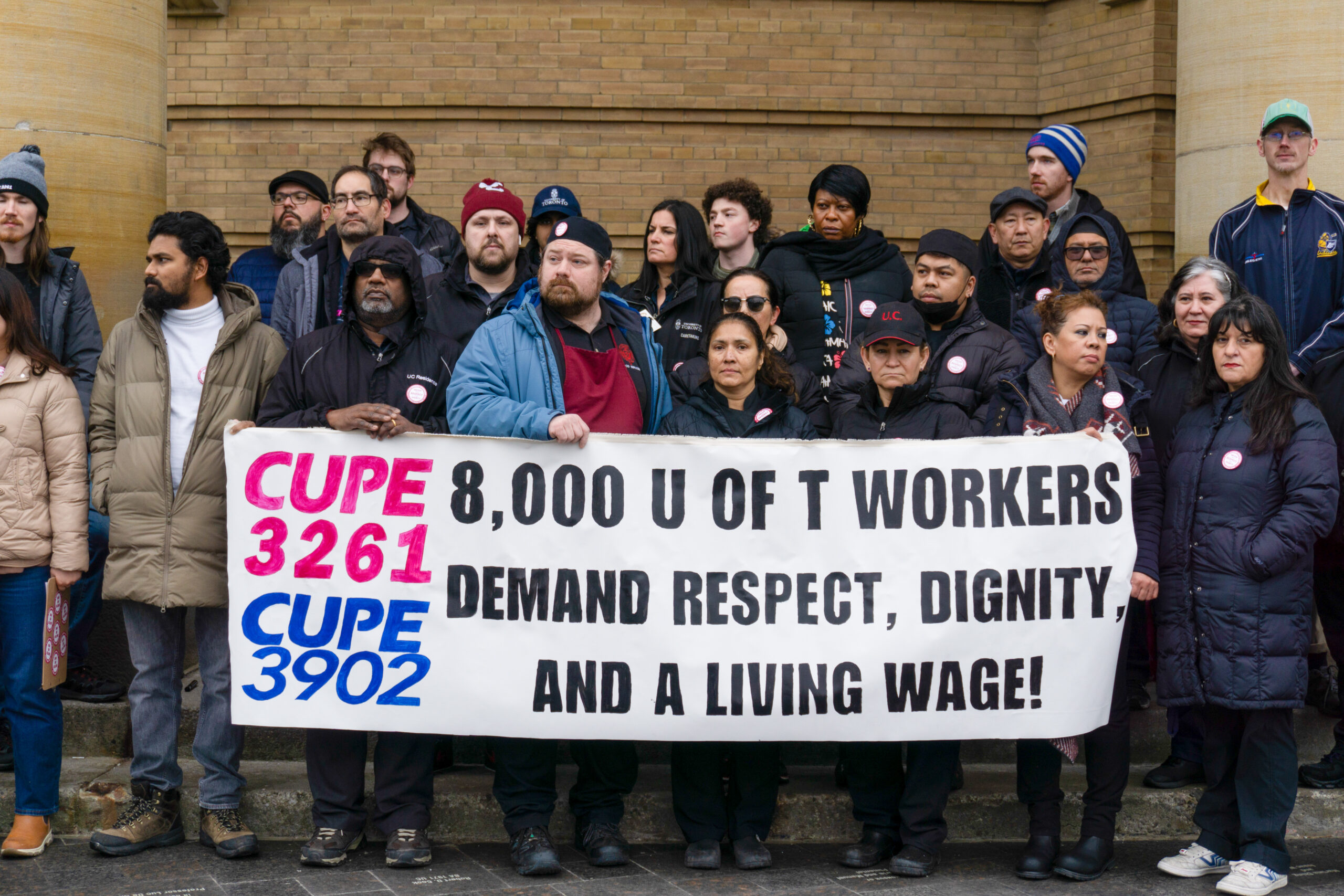The strike that never happened: The CUPE 3092 victory
Earlier this year, union workers across the University of Toronto campuses threatened to strike before reaching an agreement, a win for thousands many workers.
Earlier this year, thousands of workers including teaching assistants (TA), postdoctoral fellows, service workers, and library workers among all three University of Toronto (U of T) campuses gathered to demand better pay, support, and working conditions.
More than 8,000 workers at U of T represented by the three Canadian Union of Public Employees (CUPE) trade unions threatened to strike in February of this year. These unions, including CUPE 3092, which represents contract academic workers, CUPE 3261, which represents service workers, and CUPE 1230, which represents library workers, were ready to strike to address the affordability crisis and equality concerns on campus.
In an unprecedented move, the three U of T locals banded together and went to the negotiation table as one this year. At first, U of T refused to meet with members of the unions. Eventually, this led to 94.4 per cent of CUPE workers in need of a new contract to vote in favour of a strike.
President of CUPE 3092 Eriks Bredovskis and two TAs and members of the bargaining committee, Marie Haines and Shibi Laxman Kumaraperumal, revealed why it was time for TAs across U of T to take action in an interview with The Medium.
Overworked and underpaid
Haines explains that dignity, respect, and a living wage were CUPE 3092’s three major demands for bargaining. Members were being overworked and underpaid as class sizes continued to grow. According to Haines, the Covid-19 pandemic escalated these issues as TAs had to transition their work from in-person to online and then back to in-person.
Haines mentions that many unit 1 workers, comprising students or post-doctoral fellow TAs, did not feel recognized for their work. A wage of C$50 an hour was not enough for these workers as it does not consider the cost of living for TAs in a world that is navigating a modern affordability crisis.
“The cost of living, particularly after [Covid-19], has been skyrocketing. The funding from the university isn’t enough, particularly when considering that most of us rely only on our TA work to get by,” says Kumaraperumal. “The housing situation is unimaginable! The university housing isn’t affordable with our funding. It’s like the university pays us, and we give it all back to them.”
Intercampus transit was another issue many TAs faced, especially in situations where they had to teach classes on two or three campuses rather than just one.
In Kumaraperumal’s case, although he lives near U of T’s Scarborough campus (UTSC), he faces the issue of having to teach courses further at U of T’s St. George campus. “Many CUPE members come from [the University of Toronto Mississauga (UTM)] or UTSC and want to teach there but they can’t live there. Most of their classes, workshops and conferences are all at St. George.”
This issue posed a concern for many students as travelling across campuses takes up time and money, and according to Kumaraperumal, the university covered none of that.
Many of these concerns have been building up over time until CUPE 3092 took action earlier this year and addressed these issues.
United we stand
Luke Daccord, president of CUPE 3261, told rabble.ca in an interview, “U of T likes to talk about my local, [that represents service workers], as sort of being this non-essential part—‘it’s an area where costs should be cut wherever possible’—and you know, they told us that at the bargaining table.”
Like Daccord, Bredovskis realized that negotiations were more important than ever, regardless of their union. Bredovskis also told rabble.ca, “Why is it that we’re also split up in these different bargaining units… We kind of really came to the realization that all those different units and locals keep us divided.”
This led CUPE leaders to present their demands in one document rather than presenting individual demands from each unit to stand united while supporting each other.
After the university refused, CUPE members went on strike before the university later reached a tentative agreement with the units in March 2024.
But what if there was a strike?
The question that many students contemplated earlier in the year is what would happen if there was a prolonged strike? The CUPE 3092 going on strike would have a huge impact on many classes, meaning all tutorials and lab practicals would be cancelled, not to mention any TA office hours. The grading of any assignments or term tests would be compromised since those made up some of the responsibilities of TAs.
However, if a strike occurred with CUPE 2631 and CUPE 1230 members, the consequences could be much different and far graver.
“[The CUPE 3092] teaches students. The CUPE 3261 cleans our classrooms,” Bredovskis explains to The Medium. “They also feed us, they work in the athletics centers, and are an essential part of U of T just like educators. The same with CUPE1230, they’re the ones at the desk when you sign out books and they’re the ones who receive them when there are intercampus loans.”
Those who would strike do not only consist of TAs, but those who take care of our campus here at UTM.
It would include the people who clean our eating area at Davis where we share many laughs and wipe off our classroom whiteboards at the end of the day. The library assistants who show us how to print documents and so many other people who make life at U of T better for everyone.
If a strike occurred, U of T would become a ghost town—closed food courts and libraries with no one behind the desk. The Math Learning Center would be incomplete and full of students with questions but no TAs to answer them. Luckily, U of T met the demands of CUPE members and this did not happen.
A win for CUPE members
In the end, CUPE 3092 achieved many of its goals, including 45 per cent off the current TTC student rate and guaranteed work for some. Undergraduate TAs who completed 100 hours of work are now guaranteed work the following year. Also, mental health coverage for TAs doubled from C$2,500 to C$5,000. Whereas, for CUPE3261, all of its workers achieved a guaranteed minimum wage of C$25 an hour.
Despite these wins, this does not mean their fight is over. CUPE 3902 still has five other units that are in contract negotiations this year. However, this victory is a monumental step forward in making U of T an environment where demands are considered and heard.
Features Editor (Volume 51); Associate Features Editor (Volume 50) — Madhav is a third year student completing a double major in mathematics and computer science, and a minor in professional writing. Everyone in UTM has a unique story that makes them special and deserves to be told. As the Features Editor, Madhav wants to narrate these types of stories with creative and descriptive writing. In his off-time, Madhav loves watching anime, reading manga or fantasy novels and listening to music.


